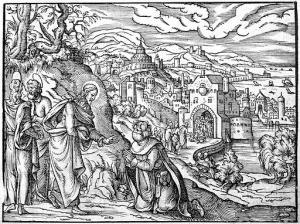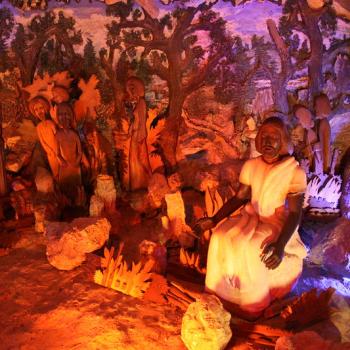
“Your faith has made you well.” (Luke 17:19)
What would we do if we were among the ten people with leprosy Jesus healed from a distance?
This question takes on new meaning as our world comes out of a global pandemic. In some ways, we are in the position of the newly healed. How do we respond?
Is Jesus Just Being Petty?
At first glance, this week’s Gospel appears ironic, falling as it does just after Jesus’ instruction to the disciples to serve and forgive without expectation of thanks. Now, Jesus has just healed ten people of leprosy, and he appears irritated when only one returns to thank him. Is Jesus being petty? Is he showing us that even he finds it dissatisfying to work without receiving gratitude?
As comforting as it is to believe that even Jesus can be grouchy (validating that emotion for the rest of us), there is much more going on here. Jesus isn’t upset merely because nine out of ten did not return to thank him. He is frustrated because his love has created an opportunity for ten people to reorient their lives and change the world. And only the Samaritan seized the opportunity.
When we respond to Love in Love, we become instruments of Love’s peace. Had the other nine who were healed fully understood what had happened to them, they would have seized their opportunity to reorient a world that had shunned them for their disease. They would have recognized the power within themselves to spread the love they had received and, little by little, heal a hurting world.
Jesus isn’t saddened by what he didn’t receive, but by what they were, as yet, unable to grasp.
Because if they can return to “normal,” then they just don’t get it.
But Isn’t This What Jesus Asked For?
Aren’t the other nine actually obeying Jesus?
That’s the obvious question, but the answer isn’t so obvious.
Ten people with leprosy stand at a distance, following the rules of their time. Declared “unclean” by law, they are shunned, destitute, and forbidden to approach those who are “clean.” So they keep away as they cry to Jesus for mercy.
Recognizing their obedience to law and societal norms, Jesus answers by telling them to show themselves to the priests. “Go to your authority,” Jesus says. “Go to the people you trust to mediate God’s power.” So they went.
And along the way, they were cleansed.
Priests were not empowered to heal leprosy. The most they could do was authorize a sacrificial ritual that would allow one who had already been healed to be reintegrated back into society. So it made sense for the newly healed to continue on their way to the priests to undergo the ritual. Some probably thought they were respecting Jesus by keeping their distance from him until they were “officially” pronounced clean.
But as theologian Michael Hardin points out, in returning to Jesus, the Samaritan chooses Jesus as his priest.
And therefore, he chooses the authority of Love.
And when we choose the authority of Love, everything changes.
No Going Back to Normal
Whereas the other nine were eager to go through the rites of reintegration and return to their lives, the Samaritan knew that his life would never be the same. There was no going back to normal.
And what was normal?
“Normal” was a world of divisions: between Jew and Samaritan, between clean and unclean, between acceptable and outcast.
“Normal” was a world in which worth must be proven rather than recognized as universal, infinite, and inherent.
“Normal” was a world in which skin diseases like leprosy were considered consequences of moral failings and punishment for sin.
“Normal” was a world of sacrifice under a sacrificial God.
And it must be stressed that this indictment of “normal” is not an indictment of Judaism. Jesus followed a merciful interpretation of Judaism. This “sacrificial normality” is the status quo under the powers of sin and rivalry and greed which seep into every human community and veil violence against the “other” under the veneer of righteousness.
“Normal” had cast the Samaritan and his fellow afflicted into the “no-man’s-land” between Samaria and Galilee. The only reason he could be with the Jews at all was because they were all unclean and cast out. They were drawn together in their marginalization and vulnerability. They might even have become friends.
But that friendship was about to end, because things were going back to “normal.”
Choosing the Authority of Love
Except for the Samaritan, who sees that the sacrificial normal is unacceptable and chooses to follow a “new normal.” Love reorients him into a new life, where divisions between Jew and Samaritan, clean and unclean, melt away. So he returns to Jesus not only in gratitude, but in obedience. He sees that God is not the Demander of Sacrifice but the Source of Love. Thus, Jesus is Love’s mediator, Love’s priest.
Jesus becomes the Samaritan’s illumination of God, revealing God’s nature in a whole new light. The Samaritan may not have been one of the original twelve, but he is now a disciple of Jesus, under the authority of Love.
Choosing the authority of Love means seeing through all the power structures that keep people divided, struggling, and suffering. It means refusing to be ruled by acquiescence to a status quo where it is assumed that the rich and powerful are more deserving than the weak and destitute.
Choosing the authority of Love means realizing our interconnection and mutual vulnerability. It means recognizing that the diseases that afflict the body are inflamed and exacerbated by the social diseases of isolation, scapegoating, and judgmentalism. It means understanding that compassion, not castigation, is the healing balm that brings health not only to the individual, but to the community.
And it’s faith, listening to and acting upon the Love already within us, that makes choosing the authority of Love possible. For Love’s authority doesn’t coerce from the outside, but inwardly guides us by speaking to our deepest essence. That’s why Jesus’ instruction is subtle, allowing the people he heals to interpret what he means by “priest.”
Faith, illuminating the authority of Love, has made the Samaritan, Jesus’ newest disciple, well. His healing is more than skin deep.
The Disease Has Been Mitigated, But Are We Well?
Now the world is emerging from the grip of a deadly pandemic. Though the disease still lingers, it has been mitigated to the point that life is resuming its course. Where do we go from here?
Will we go back to normal?
Or will we choose the authority of Love?
I include myself among the many who, like the nine, found myself eager to return to my routines. I was thrilled when my children were able to go back to school, for my sake and theirs. I was glad once again to dine in restaurants, return to church in person, and see the unmasked faces of friends and family (though I still mask in close indoor spaces!)
But if we content ourselves with “returning to normal,” we miss all the ways “normal” brought us to the brink of collapse.
“Normal” is rampant poverty and homelessness which kept many who fell ill from recovering and helped the disease to spread.
“Normal” is the lack of universal healthcare that made some people suffering from chronic illnesses more likely to die.
“Normal” is generations of systemic racism that has created vast racial wealth gaps, contributing to the disproportionate deaths from Covid among racial minorities.
“Normal” is the spirit of scapegoating that found a particular target in Asian Americans.
“Normal” is the collapse of social bonds that isolated us long before we were quarantined.
“Normal” is the judgmentalism that renders poverty a moral failing instead of a systemic injustice fueled by greed, racism, and the militarism that has prioritized US hegemony over the care of citizens.
“Normal” has already killed so many, and is making the rest of us sick.
How Have We Shown Thanks?
Furthermore, if we rush back to “normal,” we risk forgetting that we owe our survival to so many who made life possible, who still make life possible, though they often go unnoticed, underpaid, and under-cared for themselves.
The pandemic illuminated, in stark, glaring reality, how indebted we are to our “essential workers”: not only the scientists who worked on the vaccine and the doctors who administered treatment, but also:
Nurses, store clerks, fast-food and curbside restaurant employees, janitors, sanitation workers, teachers who balanced real and virtual lessons, care-givers, delivery drivers, warehouse employees who filled online orders… and so, so, so many more.
Jesus came to show us that our lives depend, not on the principalities and powers that rule over us, but on the servants who care for us. The essential workers who pulled us through this pandemic have been Jesus— embodiments of Love— in our midst.
How have we thanked them?
How have we reoriented ourselves around the revelation that Love, not wealth or status or might, is what sustains our lives?
It’s Not Too Late
In so many ways, it seems like the world has fallen back into the sacrificial normality.
But it’s not too late to turn around.
Turning around, repenting, changing our minds, means we recognize that we don’t have to be under the sacrificial authority of greed and exploitation, rivalry and division.
We can let the authority of Love that sustains us pour forth and begin to heal our deeply diseased society.
We can advocate for universal healthcare and housing and a living wage for all.
We can strive to understand and dismantle deeply-rooted systemic injustice.
We can serve one another with mutual aid and compassion.
We can recognize our interconnection and interdependence as living reflections of Love. For recognizing the authority of Love, in the end, is simply living into who we already are.
And that’s what makes us well.
Image: Woodcut: Christ healing a leper, 16th century. Contributors: Jost Amman. Work ID: dp8wd5zm. Available via Creative Commons Attribution 4.0 International license.












